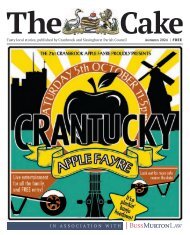Open Air Business August/September 2018
The UK's outdoor hospitality business magazine for function venues, glamping, festivals and outdoor events
The UK's outdoor hospitality business magazine for function venues, glamping, festivals and outdoor events
You also want an ePaper? Increase the reach of your titles
YUMPU automatically turns print PDFs into web optimized ePapers that Google loves.
EVENTS<br />
GETTY IMAGES<br />
Event<br />
Sponsorship<br />
Eventbrite presents advice from Nicola Lloyd, head of event<br />
marketing for Pearson Frank, on how to attract event sponsors<br />
IT FEELS like almost stating the obvious, but<br />
securing sponsorship for your events can be<br />
the difference between generating income<br />
and making a loss. It is also fair to say that<br />
sponsorship can be the difference from your<br />
event idea sitting on your hard drive and it<br />
actually going ahead in the first place.<br />
On the flip side, as a sponsor, it’s a great<br />
opportunity to get your brand visible in front<br />
of hundreds or thousands of your target<br />
audience, which can lead to new leads and a<br />
sizeable profit for your business.<br />
With so much on the line, making the right<br />
impression to potential first time sponsors<br />
for your event is crucial. So once you’ve got<br />
a great idea for an event that’s unique and<br />
interesting, it’s time to try and attract some<br />
support to bring it to fruition.<br />
Nicola Lloyd, head of event management<br />
marketing at Pearson Frank, is here to pass<br />
over knowledge that she has picked up over<br />
the years.<br />
GIVE SPONSORS<br />
1 THE INFORMATION<br />
THEY NEED TO MAKE AN<br />
INFORMED DECISION<br />
It’s all well and good if you have an idea<br />
of who your attendees are, but sponsors<br />
are equally keen to find out that<br />
information. You need to let prospective<br />
sponsors know who is likely to attend<br />
- age-range, gender, occupation,<br />
interests, etc. This is important for two<br />
reasons:<br />
› Firstly, sponsors need to know that<br />
if they are going to invest money<br />
into your event, the people that they<br />
want to attract to their business are<br />
attending<br />
› Secondly, sponsors can often use their<br />
own lead generation tactics to attract<br />
more attendees to ensure they receive<br />
a significant return on investment.<br />
The easiest way to gather this data is<br />
by collecting it at the point of purchase; if<br />
guests need to register online to attend then<br />
you can gather a lot of information that way.<br />
Once you have all of this information at your<br />
disposal, you can pull together a customer<br />
profile to demonstrate to sponsors who<br />
will be attending and how they can convert<br />
attendees into customers (obviously watch<br />
out for GDPR compliance).<br />
In your initial proposal, you should also<br />
cover all of the ‘obvious’ information. What<br />
will be the name of your event? When is<br />
it? How long will it last? Is it a one-off or<br />
a repeating event? Where will it be held?<br />
The location is especially important for<br />
potential sponsors. If attending, they need<br />
to know if their staffing capacity allows for<br />
representatives from the company in that<br />
area to physically attend without significant<br />
loss of business.<br />
USE PREVIOUS EVENT<br />
2 EXAMPLES AND<br />
EXPERIENCES WORKING<br />
WITH SPONSORS<br />
If you’ve held similar sized events in the<br />
past you could provide case studies that<br />
demonstrate to potential sponsors that you<br />
know what you are doing and can be trusted<br />
to deliver a high-quality event.<br />
Try to provide evidence of how sponsoring<br />
one of your previous events has benefitted<br />
similar companies in the past, whether<br />
it be through growth in their customer<br />
base, increases in social media numbers,<br />
or positive brand recognition through<br />
association. If sponsors can see how their<br />
competitors have benefitted, it’s more likely<br />
they’ll be interested in investing in your next<br />
event.<br />
72 WWW.OPENAIRBUSINESS.COM


















